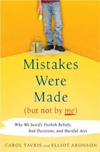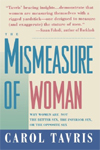BEN’S INTERVIEW WITH NOTED SOCIAL PSYCHOLOGIST, CAROL TAVRIS, Ph.D.
 We had a wonderful interview with Carol Tavris, Ph.D. on Friday, November 19, 2010.
We had a wonderful interview with Carol Tavris, Ph.D. on Friday, November 19, 2010.
TO RECEIVE THE RECORDING, submit your name and email address here:
 We had a wonderful interview with Carol Tavris, Ph.D. on Friday, November 19, 2010.
We had a wonderful interview with Carol Tavris, Ph.D. on Friday, November 19, 2010.
TO RECEIVE THE RECORDING, submit your name and email address here:
You’ll also receive a complimentary subscription to
Ben’s monthly email newsletter, The Coaching Toward Happiness News.
And please know your email address is safe with us.
We will not share or sell your email address or personal information to any person, organization, or third party.
 Carol Tavris is a social psychologist, writer, and lecturer. She earned her Ph.D. in social psychology at the University of Michigan, after majoring in both sociology and comparative literature as an undergraduate at Brandeis University. In her career as a writer and lecturer, she has sought to educate the public about the important contributions of psychological science and to explain how pseudoscience can lead us astray at best and, at worst, cause enormous personal and social harm.
Carol Tavris is a social psychologist, writer, and lecturer. She earned her Ph.D. in social psychology at the University of Michigan, after majoring in both sociology and comparative literature as an undergraduate at Brandeis University. In her career as a writer and lecturer, she has sought to educate the public about the important contributions of psychological science and to explain how pseudoscience can lead us astray at best and, at worst, cause enormous personal and social harm.
Her latest book, with Elliot Aronson, is Mistakes Were Made (But Not by Me): Why we justify foolish beliefs, bad decisions, and hurtful acts,
which has been translated into 11 foreign languages.
Mistakes Were Made (But Not by Me) examines:
 Her other best-known books include the landmark Anger: The misunderstood emotion and the award winning The Mismeasure of Woman: Why women are not the better sex, the inferior sex, or the opposite sex. And, with Carole Wade, she has published two textbooks in introductory psychology.
Her other best-known books include the landmark Anger: The misunderstood emotion and the award winning The Mismeasure of Woman: Why women are not the better sex, the inferior sex, or the opposite sex. And, with Carole Wade, she has published two textbooks in introductory psychology.
Dr. Tavris has written hundreds of articles, essays, and book reviews on topics in psychological science for a wide array of publications, including The Los Angeles Times, The New York Times Book Review, Scientific American, and the (London) Times Literary Supplement. Many of these have been recently collected in a reader, Psychobabble and Biobunk: Using psychological science to think critically about popular psychology.
An acclaimed lecturer, she regularly addresses general and professional audiences around the world–including attorneys, judges, physicians, psychologists, business leaders, and students–on many topics having to do with psychological research, including the difference between science and pseudoscience in psychology. She is a Fellow of the American Psychological Association and the Association for Psychological Science, and on the editorial board of Psychological Science in the Public Interest. She lives in Los Angeles.
Mistakes Were Made (But Not by Me)
“This book is charming and delightful. But mostly, it’s just damn smart!”
–Dan Gilbert, author of Stumbling on Happiness
One of Amazon’s Best Business Books of 2008
Amazon five-star review,
January 10, 2010
By David Larson “Dave”
(Philadelphia, PA) –This book is amazing because as you read it you go through three distinct stages of understanding.
Stage 1 (50 pages in)
You say to yourself: “Wow, I know quite a few people who are making the mistakes described in this book.”Stage 2 (halfway through)
You say to yourself: “Wow, EVERY single person I know is making the mistakes described in this book.”Stage 3 (by the time you finish the book)
You say to yourself: “Wow, I myself have been making the mistakes described in this book, and I didn’t even realize it.”
June 3, 2009
Review by Martin Poulter
For clear, engaging explanations of psychological research, this is one of the best books you can get. Cognitive biases are like optical illusions, distorting our decisions, memories and judgement. This book focuses in particular on self-directed biases: the distortions of memory and explanation that make sure that each of us is the hero, not the villain, or our own life story.
When corrupt police frame innocent people, how do they justify to themselves what they are doing? When a couple divorce, how can two former lovers come to hate each other with such passion? When political or military mistakes lead to thousands of deaths, how do the decision-makers live with themselves? The authors take academic research (on cognitive dissonance, stereotypes, obedience and more) and apply it to a wide spectrum of issues from the White House to Mel Gibson’s racism.
It is eye-opening to read how malleable and unreliable memory is, and how easy it is to create feedback loops of increasing certainty from just a glimmer of evidence. An appalling example is the recovered memory craze of the 80s and 90s, which is discussed at length. The book isn’t entirely downbeat, even though it explains how prosecutions, marriages or therapy sessions can go terribly wrong. It shows how easy it is for good people to hurt others, but that we can avoid these traps with humility and self-questioning. They call science “a form of arrogance control”.
A theme running through the work of these two psychologists is how science can address real problems of human conflict. That warm, humane spirit pervades this book and I think anybody curious about the science or the solutions would benefit from reading it.
OMagazine:
May 2007
Review by Francine Prose
A revelatory study of how lovers, lawyers, doctors, politicians–and all of us–pull the wool over our own eyes. The politician who can’t apologize, the torturer who feels no guilt, the co-worker who’ll say anything to win an argument–in case you’ve ever wondered how such people can sleep at night, a new book by Carol Tavris and Elliot Aronson supplies some intriguing and useful insights. Thanks, in part, to the scientific evidence it provides and the charm of its down-to-earth, commonsensical tone, Mistakes Were Made is convincing. Reading it, we recognize the behavior of our leaders, our loved ones, and–if we’re honest–ourselves, and some of the more perplexing mysteries of human nature begin to seem a little clearer. By the book’s end, we’re far more attuned to the ways in which we avoid admitting our missteps, and intensely aware of how much our own (and everyone’s) lives would improve if we, and those who govern and lead us, understood the power and value of simply saying, “I made a mistake. I’m sorry.”
Wrighterly.com: January 2009
Review by Stephanie Wright
Mistakes Were Made (but not by me) is a book about self-justification, the sort of rationalizing in which everyday folk engage to feel better about the poor decisions they make on an everyday basis, but it is also a book that helps illuminate the self-justification of the not-so-everyday folk and the much larger poor decisions often made by people in positions of power. Tavris and Aronson, two social psychologists, do not simply write about self-justifying phenomena; they explain to the reader the whys of them.This is perhaps the best book on a psychological topic written for the lay audience that I have read. In eight chapters (not including Tavris and Aronson’s introduction and afterword), the authors explain their underlying tenet-cognitive dissonance–and then take the reader through a series of real life applications of the need to self-justify and the places in our lives we do it most frequently. Particularly relevant to the general reader are the chapters on therapy (Chapter 4), which my Research Methods class will be reading this upcoming semester; the law (Chapter 5), which my Psychology and Law class will be reading this upcoming semester; and marriage (Chapter 6), although all chapters have much to offer everyone. For the rest of the review, click here.
Wall Street Journal:
Mistakes Were Made is by turns entertaining, illuminating and–when you recognize yourself in the stories it tells–mortifying. It is certainly true that we can be artful to the point of self-delusion when we feel guilt for something we have done.
Business Week Online:
This book should make it to the top of most summer reading lists. It speaks to the forces that keep us repeating harmful mistakes, whether it’s an everyday personal issue or an organization-wide problem. I’m interested in reading this book for a deeper window into my own behavior, but also for insight into the reasons that corruption persists around the world and vexes so many organizational and individual efforts to fight it.
Arkansas Democrat Gazette:
Social psychologists Tavris and Aronson, each of whom has published other works, here tackle “the inner workings of self-justification,” the mental gymnastics that allow us to bemoan the mote in our brother’s eye while remaining blissfully unaware of the beam in our own. Their prose is lively, their research is admirable and their examples of our arrogant follies are entertaining and instructive. For the full review, click here.
Blogcritics.org:
Kaonashi
I’ve always been a night owl. Even as a child and teenager I often went to bed late, much to my father’s frustration. He was fully convinced that I was damaging my health because of it. One time my dad took me to the doctor because I had the flu. At the doctor’s office my dad commented about my habit of going to bed late, which to him obviously contributed to my illness. The doctor explained that as long as I got enough sleep, staying up late isn’t really a big deal, and had nothing to do with me being sick. You can imagine the smirk on my face after the doctor left the room. After a moment of silence, my dad remarked, “Oh, what does he know anyway?”Why would my father, who never studied medicine, stubbornly conclude that he still knew more about human health than someone who has spent decades in that profession? Social psychologists Carol Tavris and Elliot Aronson argue that it’s due to cognitive dissonance, a psychological term describing the internal conflict that ensues when someone holds two polarizing beliefs, or when that person’s behavior goes against a particular belief. In their book Mistakes Were Made (But Not by Me): Why We Justify Foolish Beliefs, Bad Decisions, and Hurtful Acts, the authors explore people’s strong need for self-justification and the sometimes serious consequences. For the rest of the review, click here.
Metapsychology Online Reviews:
MentalHelp.net’sbookstore
Review by Daniele Procida, Cardiff University
July 31, 2007
“Carol Tavris and Elliot Aronson have made a genuinely illuminating contribution to the study of human nature, one positively brimming with intelligence and insight . . . They are to be congratulated for this immensely engaging and intelligent volume, for shedding some illumination on that dark side of human behavior when it starts to go wrong and then gets horribly worse.”There is a vast body of literature on how to do well, how to be happy, what to do and choose for one’s own benefit and that of others. This body covers a range from the vulgar to the great moral philosophers. We are not short of such analyses or guidance.
In contrast, the body of work which considers our failure to do well and be good is decidedly smaller, and also, it must be said, rather lamer, particularly in its power to explain why we fall into foolish beliefs, make bad decisions and commit hurtful acts. We remain opaque to others and to ourselves, thinking, acting and responding in ways which are harmful, counter-productive and baffling. Most baffling of all is our propensity to continue in these patterns, to compound error with error and throw good vigorously after bad.
Attempts at explanation tend towards exasperated (and inadequate) conclusions of egoism, stupidity or evil, or contentious structures of historical, social or psychological theory to provide some sort of answer. Mistakes Were Made (But Not by Me) offers an alternative to these by describing the workings of a simple process, one which by its nature is hidden from our view. This process is self-justification, and it is driven by an engine of cognitive dissonance, the discomfort we feel at the gap between our self-image and the less attractive reality that sometimes confronts us. For the rest of this review, click here.
American Scientist:
William B. Swann, Jr., University of Texas, Austin
Sept/October 2007
There are at least two kinds of deceptive statements. The more common and familiar type (“I did not have sexual relations with that woman”) is made willfully, with the goal of misleading listeners into believing something that the deceiver knows to be untrue. The second sort (“They’re trying to say ‘Did you make a mistake going into Iraq?’ And the answer is ‘Absolutely not.’”) is made when the speaker has persuaded himself that something false is actually true. In Mistakes Were Made (But Not by Me), authors Carol Tavris and Elliot Aronson focus on this latter category, which involves self-deception.The authors make a compelling case that self-justifications of this sort are especially pernicious, because they allow the person making them to feel better while remaining unaware of what is happening. Thus emboldened, he or she will not only fail to take corrective action but will be prone to make additional mistakes, be untruthful about them and so on. Even if this individual is not the leader of the free world, the results can be catastrophic. For the rest of this review, click here.
Bookgarden:
I thought I knew all about self-justification, but no, my understanding didn’t begin to account for the 90% of that iceberg, submerged and out of sight.This is a fascinating book, and the authors take the reader through example after example, study after study. Why would a prosecuting attorney refuse to change his opinion after DNA proved that the accused was not guilty? Why can’t psychologists, doctors, police, politicians, husbands, wives, teachers, students, bosses, employees admit they made mistakes? What procedures and strategies are at work? The authors reveal the process, revealing how easy it is to compound and magnify our errors because we are so busy justifying our decisions.
Sometimes floored, sometimes angry, sometimes sad, sometimes amused, but always interested, I can only hope that I will be able to apply some of what I learned in my own life.
curled up with a good book.com:
Carol Tavris and Elliot Aronson’s book bears a very prescient message: Just how does one learn from one’s mistakes if one refuses to admit culpability? With straightforward language and a readable style, Tavris and Aronson’s book will open your eyes and improve your life–that is, it will if you let it.
PsycCritiques:
Contemporary Psychology: APA Review of Books
By Kathleen E. Cook and Melissa Grinley
February 7, 2008
Both Carol Tavris (The Mismeasure of Woman) and Elliot Aronson (The Social Animal) have demonstrated a flare for writing clearly and passionately about social psychology. Together these accomplished authors and highly respected psychologists have produced this informative and eminently readable book. The book is written for the general public but can be appreciated by the psychologist and nonpsychologist alike. It would also make an effective undergraduate class supplement. It is filled with wonderfully vivid examples and amazingly appropriate quotes.
The evenhandedness with which the authors treat self-justifiers is one of the book’s strengths. The perspectives of both the therapist and the client, the detective and the false confessor, the husband and the wife, and so on, are examined. Rather than painting a picture of the self-righteous as evil, the authors show us how these individuals have painted themselves into a corner and how their obstinate position is an understandable and very human one.


